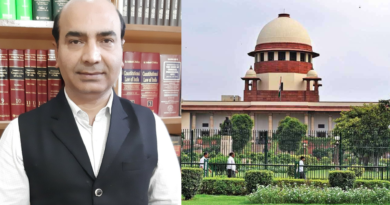Operation Sindoor: Standing in Solidarity with In-Service Indian Women Army Officers as Supreme Court Blocks Their Release, Urges to Utilize their Expertise
(Syed Ali Taher Abedi)
New Delhi, May 9 – In a significant order underscoring both national security and gender equity, the Supreme Court of India has stayed the release of all in-service women officers in the Indian Army until further notice. The interim relief was granted by a bench comprising Justice Surya Kant and Justice N.Kotiswar Singh during a hearing held earlier today.
The court emphasized the importance of retaining experienced and capable women officers in uniform, particularly amid heightened military tensions following the recent terror attack in Pahalgam. Justice Surya Kant made strong observations in support of the armed forces, stating, “This is not the time to keep these officers running around courtrooms. There are better places for them to serve right now. Their morale must remain high—very high.”
AoR Amrita Panda & Senior Advocate Menaka Guruswamy appeared for the petititoner.
A Call to Respect and Retain Those Who Serve
The matter came up in connection with Lt. Col. Geeta Sharma, a Short Service Commission officer, whose case was represented by senior advocate Menaka Guruswamy. Guruswamy argued that the officer had served with distinction in hardship postings and deserved continued service. She also pointed to the example of Lt. Col. Sophia Qureshi—who led India’s Operation Sindoor—highlighting that such excellence would not have been possible had the Supreme Court denied women officers permanent commission, as it had in the past in the Babita Puniya case.
“Until February 17, 2020, there was no provision for granting permanent commission to women officers. As a result, their Annual Confidential Reports (ACRs) were often written in a rather casual manner. Since careful and favourable grading of these reports held little significance, the focus remained minimal. Even under the short-service commission term dated July 20, 2006, women officers were only eligible for service extensions upon completing their 10th year. To qualify for an extension, they needed to secure at least 60% marks, the minimum qualifying criteria. However, inter-se merit, which determines comparative rankings, was only applicable for granting permanent commission, not for service extensions.”
Supporting the Indian Army’s broader interest, Additional Solicitor General (ASG) Aishwarya Bhatti also weighed in with a heartfelt remark: “While the nation sleeps, our defence forces are awake all night. These officers represent the best of our service.”
However, the ASG also argued that the Army operates under a steep pyramidal structure, which limits the number of officers who can be retained long-term, and underlined that Lt. Col. Sharma was granted a four-year extension, but was not found fit for permanent commission in 2020. After completing her term in 2024, she was released and granted terminal leave under existing regulations.
“Blend Experience with Youth,” says SC
Responding to the structural concerns of the Army, Justice Kant acknowledged the need for both young and experienced officers: “A blend is essential. Young officers must be guided and trained by those with experience. When our soldiers stand guard at 16,000 feet in harsh conditions, they don’t complain. They make all of us feel small in comparison to their sacrifices.”
He concluded the hearing by clearly stating that all issues would be settled on merit at the appropriate time, but until then, the officers must not be released from service.
Direction of the Court
“All women Army officers currently in service shall not be released until the next date of hearing. The matter will be decided on merits,” the bench ruled.
The case has been adjourned for further hearing. Meanwhile, the Supreme Court has sent a strong signal to both the Army and the nation—to stand by those who serve and ensure their dedication is met with fairness and dignity.




